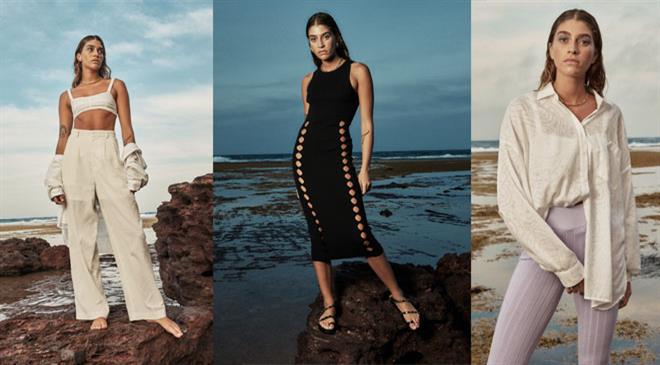
Milly & Kobe Kan
Founders
MNK Atelier
We incorporate timeless design and long-lasting quality
MNK Atelier is a Sydney-based slow-fashion brand that combines style, luxury, and sustainability in its collections. The brand prioritises elevated tailoring, luxurious fabrics, and timeless designs and its clothes are made exclusively from organic fabrics, natural fibres, recycled materials, and sustainably sourced Japanese fabrics. In an interview with Fibre2Fashion, Founders Milly and Kobe Kan discuss the need for slow fashion and its challenges.
Fibre2Fashion: What inspired you to start a sustainable fashion brand, and how did you get started?
Milly & Kobe Kan:
We always dreamt of starting a fashion business together when we were kids, and Kobe has shown strong interest in fashion and all things beautiful at an early age. We always wanted to start something meaningful when we envisioned to have a business together eventually. Milly has a background in finance and investment banking, while Kobe has a background in fashion design and production. When both of our worlds combined, we knew we would have something special, perhaps a unique perspective to create high-quality investment pieces where sustainability and luxury co-exist. When we were looking for clothes that are timeless, sustainable, of high quality and can last for a long time, there were limited options, or they were missing something. That was when MNK Atelier was born.
F2F: How do you define ‘slow fashion’, and how does your brand incorporate this philosophy into its products and processes?
M&KK:
‘Slow fashion’ is the opposite of fast fashion. It means to slow down the pace in fashion cycle. It is a holistic approach to the whole process of making clothes from yarns and fabrics to manufacturing and supply chain. Our curated range of seasonless and classic clothing is made in small production run from premium quality fabrics.
F2F: What does MNK stand for?
M&KK:
MNK stands for Milly and Kobe, the founders of MNK Atelier as a collaborative business. It is also the acronym for Modern, Nostalgic, Kind which are intertwined in our brand DNA and practice.
F2F: How would you define the aesthetics and style of your collection?
M&KK:
Sophisticated, simple with a twist, elegant yet relaxed, and minimalistic.
F2F: What are some of the challenges you face in promoting a ‘slow fashion’ brand in a market that is dominated by ‘fast fashion’?
M&KK:
A lot! As a slow fashion brand producing in small quantity of high-quality clothes, our production, wages, fabrics, garment finishes, trims, and logistics cost much higher compared to fast fashion. Since we do not have a large volume like other fast fashion brands, we cannot meet the required minimum production volume. Hence, production cost for us is much higher than these brands.
F2F: How do you ensure that your brand’s production processes are sustainable and ethical, and what steps do you take to reduce your environmental footprint?
M&KK:
We try to be sustainable and ethical in different areas of our business. From selecting fabrics to manufacturing, our brand has a big focus on sustainability and luxury. We have the planet in mind and that is why we use sustainable high-quality fabric made in Japan, including botanical dyed organic cotton, recycled Japanese PET bottles and Japanese paper ‘washi’. Our curated range is made in small production run in small factories in China. Our packaging and trims in every garment are also created consciously, for example biodegradable polybags, FSC certified hang tags, care labels made from recycled materials etc. We opt in for GoGreen logistics solution whenever possible. We want to improve and be better one step at a time.
F2F: What are some of the benefits of conscious fashion, both for consumers and for the fashion industry as a whole?
M&KK:
Conscious fashion encourages brands to produce less while taking more time to create more thoughtful design, instead of pumping a lot of styles to create newness. Trendy pieces will only last for a season or less than a year and then are significantly discounted to make room for new season, and in extreme cases these clothes are burnt or disposed of which get piled up in the landfill. This vicious cycle is not sustainable at all. To prolong the lifespan of a garment, fashion brands should come out with care guide for consumers so that they know how to take care of the garment, e.g., delicate washing, eco-friendly dry cleaning etc. It can also include suggestions to avoid overconsumption and wastage like repairing instead of replacing, reselling, donating etc. Thus, there are so many ways!
F2F: How do you communicate the value of ethical fashion to your customers, and what strategies do you use to educate them about the importance of ethical and sustainable fashion?
M&KK:
We have written articles on our official website regarding the high-quality fabric we used to produce our debut collection. We have provided care instructions for these special fabrics—some of them made in Japan while others are sustainable materials—for consumers to follow. We have also included garment care guide where consumers will know how to take care of the sustainable fabrics as they are new to a lot of consumers compared to conventional fabrics.
F2F: How do you see the future of the fashion industry evolving, and what role do you believe slow fashion will play in that evolution?
M&KK:
Despite the fact that fast fashion dominates the whole industry, people started to step back and give sustainability a thought especially during the pandemic. It is undeniably challenging to combine fashion and sustainability as it takes time to tackle such issue in one of the biggest industries in the world and definitely cannot be resolved within a short period of time. The constant demand in fast fashion, newness, trendiness is making sustainability very difficult. Also, new technology to develop sustainable fabric does not happen in one day. Therefore, it is better to start looking into sustainability as early as possible, even living sustainably. If we all work towards the same goal collaboratively, the future of the fashion industry will be brighter.

Rahul Mehta
Bill D’Arienzo
Pradip Mehta
Aseem Prakash
Arun Sirdeshmukh
Abhay Gupta
Fanny Vermandel
Gabi Seligsohn
Rahul Mehta
Anurag Batra












_8.JPG)


